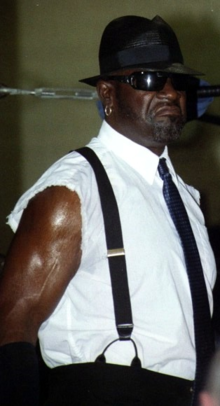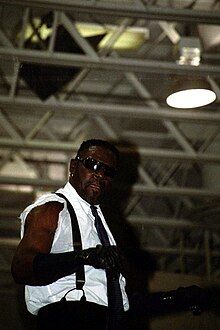Curtis Hughes
| Curtis Hughes | |
|---|---|
 Hughes in May 2001 | |
| Born | December 7, 1964[1] Kansas City, Missouri, U.S.[1] |
| Professional wrestling career | |
| Ring name(s) | The Big Cat[2][3] Big Cat Hughes[3] Curtis Hughes[3] Gotch Gracie[1] Mr. Hughes[2] The Ruffneck |
| Billed height | 6 ft 6 in (1.98 m)[4] |
| Billed weight | 374 lb (170 kg)[4] |
| Billed from | Kansas City, Kansas |
| Trained by | Sonny Myers[3] Bob Geigel[3] |
| Debut | 1983[2] |
Curtis Hughes (born December 7, 1964) is an American professional wrestler, also known by the ring name Mr. Hughes. He is best known for his stints in World Championship Wrestling and the World Wrestling Federation. He also worked for the American Wrestling Association, the American Wrestling Federation and Extreme Championship Wrestling. He trained wrestlers at WWA4 wrestling school for more than ten years and wrestles on the independent circuit.
Professional wrestling career
[edit]Early career (1988–1990)
[edit]While briefly attending Kansas State University, Hughes played on their football team.[5] After leaving university, he trained for professional wrestling under Sonny Myers and Bob Geigel. He debuted in 1988 for Central States Wrestling, before moving to the American Wrestling Association as a face under the ring name Curtis "The Cat" Hughes.
World Championship Wrestling (1990–1992)
[edit]He moved to World Championship Wrestling in November 1990, where he was called Big Cat. At Starrcade 1991 in Tokyo Dome, he was billed as the Big Cat, teaming with the Motor City Madman. He subsequently became known as Mr. Hughes, a heel enforcer gimmick with a suit and constant frown. He was a member of The York Foundation faction.[5] He later became bodyguard for Lex Luger and his manager Harley Race, coming down to ringside with Race in the closing moments of Luger's win of the vacant WCW World Heavyweight Championship, distracting opponent Barry Windham so that Luger, under orders from Race, could administer a piledriver to win the match and the championship. Champion Luger, manager Race and bodyguard Hughes formed a heel faction, inflicting beatdowns to Luger's challengers and with Hughes and Race interfering in Luger's title matches. This ultimately resulted in Hughes being banned from ringside for Luger's high profile title defences against Ron Simmons at Halloween Havoc 1991 and Rick Steiner at Clash of the Champions XVII. Still managed by Race, in early 1992 he also teamed frequently with Big Van Vader, Cactus Jack and Vinnie Vegas.
In summer 1992, near the end of his WCW run, he turned face and became Big Cat again, teaming with Junkyard Dog to feud with The Vegas Connection.
World Wrestling Federation (1993)
[edit]After a short stint in the United States Wrestling Association, Hughes joined the World Wrestling Federation in March, as part of the feud between The Undertaker and Harvey Wippleman. Hughes stole The Undertaker's urn, but then lost every match between them and relinquished it. He left the WWF in August. During his stay, he also lost to Mr. Perfect by disqualification in the 1993 King of the Ring. Hughes' last televised match was against Tatanka, which he lost via countout when his sunglasses cracked into his eyes. Hughes was released the next day.
Eastern/Extreme Championship Wrestling (1993–1994, 1996, 1998)
[edit]In October 1993, Hughes debuted for Eastern Championship Wrestling. After the promotion was renamed Extreme Championship Wrestling in 1994, he became bodyguard for Shane Douglas during Douglas' first and second ECW World Heavyweight Championship reigns. He frequently teamed with Douglas, as well as wrestling in singles matches, nicknamed "The Ruffneck".
During this period, he also made appearances in the American Wrestling Federation, where he was a part of Shiek Adnan Al-Kaissey's heel stable. Did also many appearances in Puerto Rico for the World Wrestling Council where he battled against Carlos Colón, Invader 1 and Abdullah The Butcher.

Return to the WWF (1997, 1999)
[edit]Hughes made two more brief appearances for the WWF. First, in January 1997 as Hunter Hearst Helmsley's bodyguard before being replaced by Chyna in February.[6]
Then in September 1999 he returned again as a masked opponent for Chris Jericho called "Gotch Gracie". This was later revealed to be a set up when both attacked Ken Shamrock and "Gracie" revealed himself to be Jericho's new bodyguard (as Curtis Hughes). Hughes was notably smaller in this run having lost a significant amount of weight. He aligned himself with Jericho and Howard Finkel (who was Jericho's lackey at the time) however Jericho turned on him during a tag team match and Hughes lost Finkel in a poker game to the APA. He then left the WWF again.
World Wrestling Alliance and the independent circuit (1999–present)
[edit]In 1999, Hughes lost a lot of weight and began working on the independent circuit and later became head trainer at the Atlanta-based World Wrestling Alliance's WWA4 Wrestling School. In late 2003, Hughes worked for the newly formed All World Wrestling League/Big Time Wrestling. In 2006, WWA4 launched a locally-aired professional wrestling program, which Hughes co-hosted with announcer and the executive producer, Taylor McKnight. When Mcknight left WWA4 for Great Championship Wrestling, Dave Wills co-hosted with Hughes. After beginning classes at the WWA4 school, Hughes' weight dropped from 310 pounds to 250 pounds.[5]
In 2007, Hughes began a high-profile Memphis Wrestling feud when he called Jerry Lawler a "sell out" for not showing up for a scheduled match against Hulk Hogan (Lawler worked for World Wrestling Entertainment, who objected to the match). Hughes shoved Lawler's real life girlfriend, Renee, on an episode of Memphis Primetime, and the two battled three weeks later at Sam's Town River Palace Arena in Tunica, Mississippi. The match ended when Hughes kneeled and apologized to Lawler, before hitting him with a low blow and punching Renee in the face, thus losing by disqualification.
In March 2011, Hughes headlined the inaugural Redneck Wrasslin Organization card in Springfield, Illinois, teaming with Pretty Boy Floyd and Beast to defeat Team Dragonfire.
On February 18, 2012, Hughes won a 34-man battle royal for the vacant Peachstate Wrestling Alliance Heritage Championship.[7]
On April 11, 2016, he stepped down as head trainer of WWA4 with his trainee AR Fox taking over the role.[8]

Championship and accomplishments
[edit]- Galaxy Wrestling Federation
- GWF Heavyweight Championship (1 time)[9]
- Independent Wrestling Network
- IWN Heavyweight Championship (1 time)[2]
- International Wrestling Union
- IWU Heavyweight Championship (1 time)[1]
- Peachstate Wrestling Alliance
- PWA Heritage Championship (1 time)[7]
- Pro Wrestling Illustrated
- Southern States Championship Wrestling
- SSCW Heavyweight Championship (1 time)[1]
- Other titles
- ASW Brass Knuckles Championship (1 time)[1]
References
[edit]- ^ a b c d e f g "Accelerator3359 profile".
- ^ a b c d "OWOW profile". Archived from the original on January 3, 2012. Retrieved May 6, 2007.
- ^ a b c d e "Cagematch profile".
- ^ a b Shields, Brian; Sullivan, Kevin (2009). WWE Encyclopedia. DK. p. 216. ISBN 978-0-7566-4190-0.
- ^ a b c "WWA4 profile". Archived from the original on July 18, 2011. Retrieved August 21, 2009.
- ^ Mick Foley (2000). Have A Nice Day: A Tale of Blood and Sweatsocks. HarperCollins. p. 213. ISBN 0-06-103101-1.
- ^ a b "PWA champions roll call". Archived from the original on April 10, 2012.
- ^ Meltzer, Dave (April 14, 2016). "Daily Update: Cauliflower Alley Club 2016; exit the Dragon". Wrestling Observer Newsletter. Retrieved April 15, 2016.
- ^ Royal Duncan & Gary Will (2000). Wrestling Title Histories (4th ed.). Archeus Communications. ISBN 0-9698161-5-4.
- ^ "Archived copy". Archived from the original on February 27, 2009. Retrieved March 26, 2009.
{{cite web}}: CS1 maint: archived copy as title (link)
External links
[edit]- Curtis Hughes at IMDb
- Curtis Hughes's profile at Cagematch.net , Internet Wrestling Database
- 1964 births
- African-American professional wrestlers
- American male professional wrestlers
- Kansas State Wildcats football players
- Living people
- Sportspeople from Kansas City, Missouri
- Professional wrestlers from Missouri
- American professional wrestling trainers
- 21st-century African-American people
- 20th-century African-American sportsmen
- 20th-century male professional wrestlers
- 20th-century American professional wrestlers
- 21st-century male professional wrestlers
- 21st-century American professional wrestlers
- 1988 professional wrestling debuts
